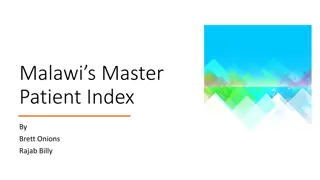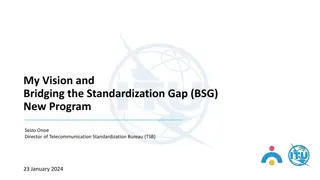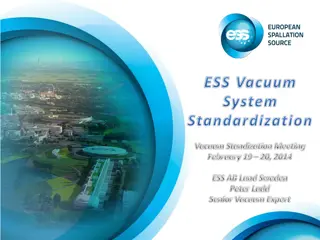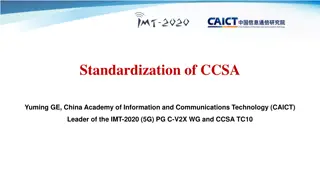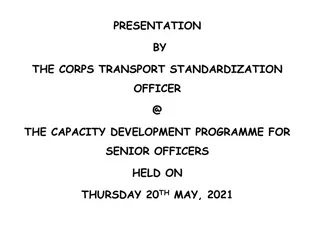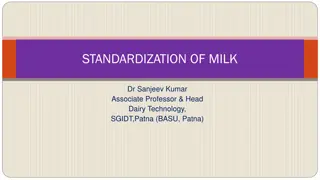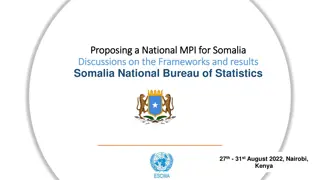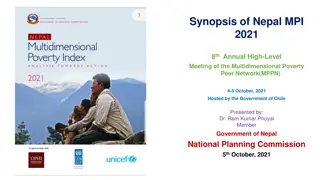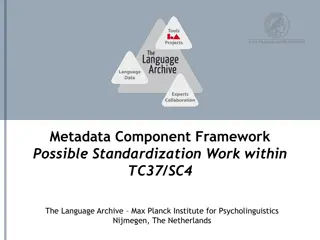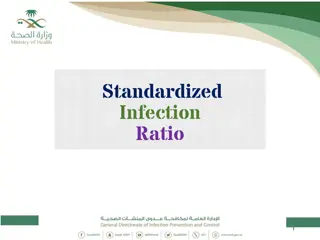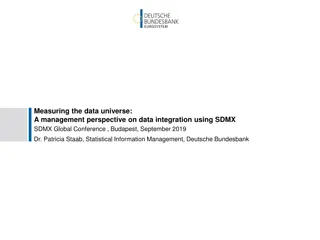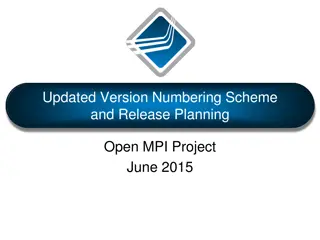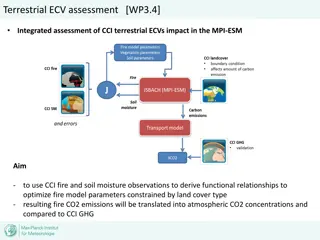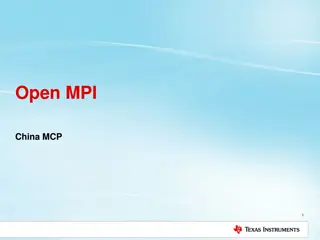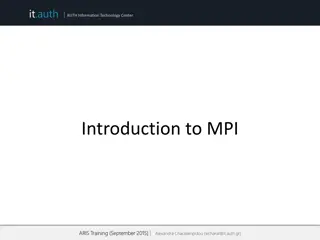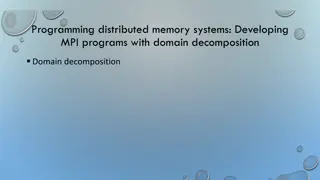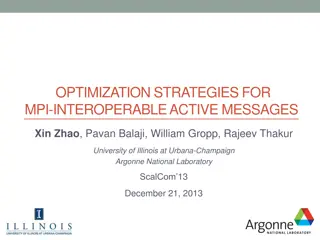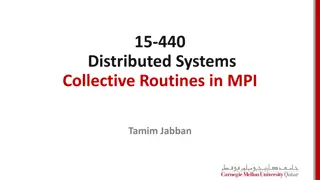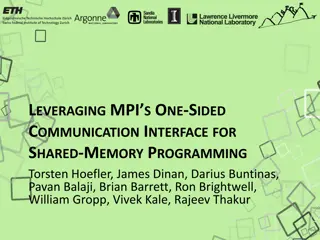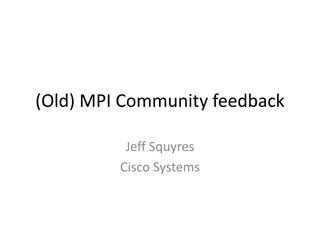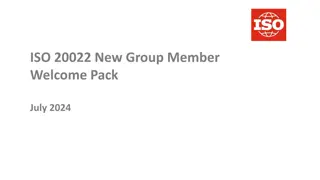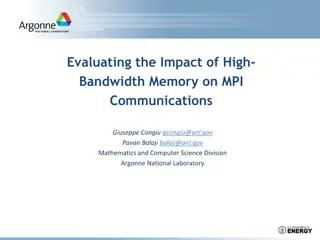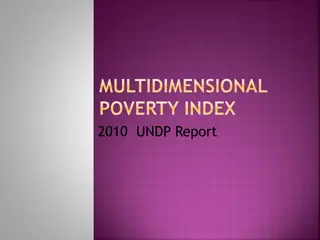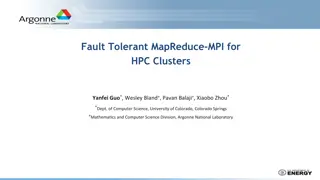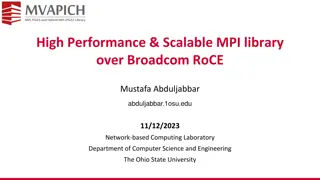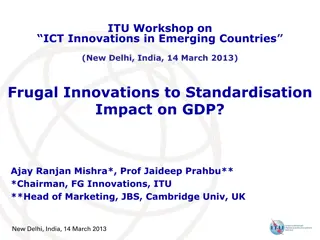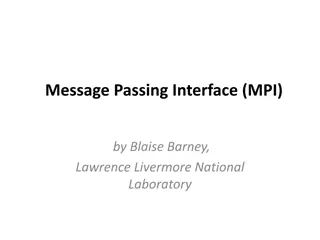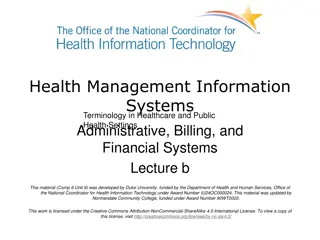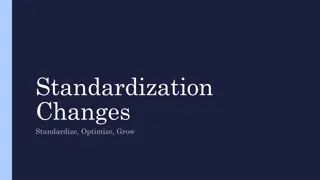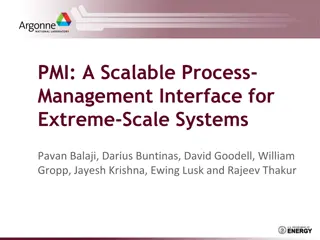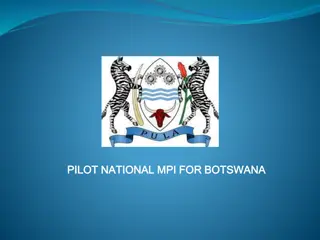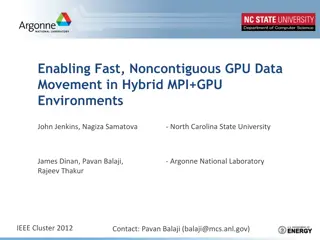Computational Physics (Lecture 18)
The basic structure of MPICH and its features in Computational Physics Lecture 18. Understand how MPI functions are used and linked with a static library provided by the software package. Explore how P4 offers functionality and supports parallel computer systems. Discover the concept of clusters in
0 views • 38 slides
Transforming Scientific Data Standardization with Large Language Models (LLMs)
Large Language Models (LLMs) to standardize scientific data, including data format standardization, automatic extraction of metadata, data annotation, data quality assessment, data cleaning, and documentation.
2 views • 5 slides
Standardization Concepts for CubeSat Applications
Understanding the importance of standardization in CubeSat applications, this document discusses the need for reliability and the adoption of SAVOIR standardization for avionics. It covers the mapping of SAVOIR functionalities into CubeSat architecture and explores how standardized practices can enh
2 views • 15 slides
Enhancing Healthcare Services in Malawi through the Master Patient Index (MPI)
The Master Patient Index (MPI) plays a crucial role in Malawi's healthcare system by providing a national patient identification system to improve healthcare quality and treatment accuracy. Leveraging the MPI aims to dispense unique patient IDs, connect with existing registries, enhance data managem
4 views • 8 slides
My Vision and Bridging the Standardization Gap (BSG) New Program
Seizo Onoe, Director of Telecommunication Standardization Bureau, presents his vision for bridging the standardization gap, emphasizing the importance of industry engagement and wide adoption of standards for global benefit and market growth. By enhancing cooperation between standardization bodies a
1 views • 11 slides
Crash Course in Supercomputing: Understanding Parallelism and MPI Concepts
Delve into the world of supercomputing with a crash course covering parallelism, MPI, OpenMP, and hybrid programming. Learn about dividing tasks for efficient execution, exploring parallelization strategies, and the benefits of working smarter, not harder. Discover how everyday activities, such as p
0 views • 157 slides
ESS Vacuum System Standardization Meeting Overview
The ESS Vacuum System Standardization Meeting held in Lund, Sweden, focused on standardizing vacuum equipment and requirements for accelerator, target, and neutron scattering instruments. The scope of activities of the ESS vacuum team, vacuum requirements, integrated approach, and available faciliti
0 views • 8 slides
Standardization and Innovation in China's Telecommunication Sector
This content delves into the standardization efforts lead by Yuming GE from China Academy of Information and Communications Technology (CAICT) in the IMT-2020 (5G) field. It highlights the various technical committees and special task groups under CCSA responsible for different facets of communicati
1 views • 14 slides
Road Transport Safety Standardization: The Role of the Corps Transport Standardization Officer
The presentation highlights the Road Transport Safety Standardization policy and the role of the Corps Transport Standardization Officer in regulating fleet operators, ensuring safe transportation operations, and promoting a culture of safety consciousness. It covers the functions of the officer, im
1 views • 13 slides
Understanding Milk Standardization: Methods and Objectives
Milk standardization is the process of adjusting milk constituents to meet legal requirements and ensure product uniformity. This involves reducing butterfat content through addition of skim milk or removal of cream. The primary objectives include legal compliance, uniform product quality, and effic
0 views • 13 slides
Proposal for National MPI using SHDS Data in Somalia
The proposal discusses the creation of a National Multidimensional Poverty Index (MPI) for Somalia using data from the Somali Health and Demographic Survey (SHDS). The SHDS, with a sample size of 16,360 households, aims to provide insights into the health and demographic characteristics of the Somal
0 views • 26 slides
Overview of Nepal MPI 2021 and Multidimensional Poverty Peer Network Meeting
The 8th Annual High-Level Meeting of the Multidimensional Poverty Peer Network (MPPN) was hosted by the Government of Chile on 4-5 October, 2021. Dr. Ram Kumar Phuyal from the Government of Nepal National Planning Commission presented at the event. The meeting discussed poverty, its measurement tech
1 views • 20 slides
Achieving Comparable Results in Laboratory Practice
Good laboratory practice necessitates minimal error in measurement to reflect a patient's biological condition accurately, ensuring comparable and reliable results regardless of testing location or method. Standardization, harmonization, and traceability play crucial roles in achieving uniformity an
0 views • 29 slides
Standardization Process for Metadata Components in Language Archives
The standardization process for metadata components within TC37/SC4 at the Language Archive Max Planck Institute involves analyzing existing metadata sets, seeking input from the CLARIN EU community, and determining the next steps for standardization. The process includes forming submission groups,
0 views • 23 slides
A Handbook for Building National MPIs: Practical Guidance for Ending Poverty
This handbook provides detailed practical guidance on creating a technically rigorous permanent national Multidimensional Poverty Index (MPI). Jointly developed with UNDP, it aims to accelerate progress towards the Sustainable Development Goals by offering insights from countries' experiences in des
3 views • 18 slides
Understanding Standardized Infection Ratio (SIR) in Healthcare
The Standardized Infection Ratio (SIR) is a crucial metric used to monitor Healthcare-Associated Infections (HAIs) at various levels. It allows for improved risk adjustment and comparison by providing a single summary number. Standardization methods like direct and indirect standardization help in a
0 views • 44 slides
Managing Data Integration: A Management Perspective
The data universe is expanding rapidly, leading to challenges in organizing and extracting valuable information. Dr. Patricia Staab discusses the importance of integrating data using SDMX at the SDMX Global Conference in Budapest. The approach involves moving towards an application-driven architectu
0 views • 12 slides
Open MPI Project: Updated Version Numbering Scheme & Release Planning
Explore the transition from an odd/even version numbering scheme to an A.B.C version triple for Open MPI project, addressing issues with feature adoption and stability. This update aims to deliver new features efficiently and maintain backward compatibility effectively.
0 views • 36 slides
Integrated Assessment of Terrestrial ECV Impact in MPI-ESM
Utilizing CCI fire and soil moisture observations to optimize fire model parameters in MPI-ESM. The study focuses on deriving functional relationships to enhance accuracy in predicting fire CO2 emissions and their impact on atmospheric CO2 concentrations compared to CCI GHG data. JSBACH-SPITFIRE fir
0 views • 7 slides
Understanding Open MPI: A Comprehensive Overview
Open MPI is a high-performance implementation of MPI, widely used in academic, research, and industry settings. This article delves into the architecture, implementation, and usage of Open MPI, providing insights into its features, goals, and practical applications. From a high-level view to detaile
0 views • 33 slides
Introduction to Message Passing Interface (MPI) in IT Center
Message Passing Interface (MPI) is a crucial aspect of Information Technology Center training, focusing on communication and data movement among processes. This training covers MPI features, types of communication, basic MPI calls, and more. With an emphasis on MPI's role in synchronization, data mo
0 views • 29 slides
Developing MPI Programs with Domain Decomposition
Domain decomposition is a parallelization method used for developing MPI programs by partitioning the domain into portions and assigning them to different processes. Three common ways of partitioning are block, cyclic, and block-cyclic, each with its own communication requirements. Considerations fo
0 views • 19 slides
Optimization Strategies for MPI-Interoperable Active Messages
The study delves into optimization strategies for MPI-interoperable active messages, focusing on data-intensive applications like graph algorithms and sequence assembly. It explores message passing models in MPI, past work on MPI-interoperable and generalized active messages, and how MPI-interoperab
0 views • 20 slides
Understanding Collective Communication in MPI Distributed Systems
Explore the importance of collective routines in MPI, learn about different patterns of collective communication like Scatter, Gather, Reduce, Allreduce, and more. Discover how these communication methods facilitate efficient data exchange among processes in a distributed system.
0 views • 6 slides
Dynamic Load Balancing Library Overview
Dynamic Load Balancing Library (DLB) is a tool designed to address imbalances in computational workloads by providing fine-grain load balancing, resource management, and performance measurement modules. With an integrated yet independent structure, DLB offers APIs for user-level interactions, job sc
0 views • 27 slides
Leveraging MPI's One-Sided Communication Interface for Shared Memory Programming
This content discusses the utilization of MPI's one-sided communication interface for shared memory programming, addressing the benefits of using multi- and manycore systems, challenges in programming shared memory efficiently, the differences between MPI and OS tools, MPI-3.0 one-sided memory model
0 views • 20 slides
Challenges and Feedback from 2009 Sonoma MPI Community Sessions
Collected feedback from major commercial MPI implementations in 2009 addressing challenges such as memory registration, inadequate support for fork(), and problematic connection setup scalability. Suggestions were made to improve APIs, enhance memory registration methods, and simplify connection man
0 views • 20 slides
Government Funding Options for Kiwifruit Growers in June 2021
Ministry for Primary Industries (MPI) provides various funding schemes and ongoing projects to support kiwifruit growers, including environmental schemes, Māori landowners' support programs, and Sustainable Food and Fibre Futures. These initiatives offer financial assistance, mediation for financia
0 views • 7 slides
Overview of ISO 20022 Standardization and Governance Framework
ISO 20022 is a comprehensive standardization approach for financial services, emphasizing common methodologies, processes, and repositories. The ISO 20022 Welcome Pack outlines key ingredients, development processes, and the eight essential parts of ISO 20022. Governance is managed by the Registrati
0 views • 25 slides
Impact of High-Bandwidth Memory on MPI Communications
Exploring the impact of high-bandwidth memory on MPI communications, this study delves into the exacerbation of the memory wall problem at Exascale and the need to leverage new memory technologies. Topics covered include intranode communication in MPICH, Intel Knight Landing memory architecture, and
0 views • 20 slides
Understanding the Multidimensional Poverty Index (MPI)
The MPI, introduced in 2010 by OPHI and UNDP, offers a comprehensive view of poverty by considering various dimensions beyond just income. Unlike traditional measures, the MPI captures deprivations in fundamental services and human functioning. It addresses the limitations of monetary poverty measur
0 views • 56 slides
Fault-Tolerant MapReduce-MPI for HPC Clusters: Enhancing Fault Tolerance in High-Performance Computing
This research discusses the design and implementation of FT-MRMPI for HPC clusters, focusing on fault tolerance and reliability in MapReduce applications. It addresses challenges, presents the fault tolerance model, and highlights the differences in fault tolerance between MapReduce and MPI. The stu
1 views • 25 slides
Enhancing HPC Performance with Broadcom RoCE MPI Library
This project focuses on optimizing MPI communication operations using Broadcom RoCE technology for high-performance computing applications. It discusses the benefits of RoCE for HPC, the goal of highly optimized MPI for Broadcom RoCEv2, and the overview of the MVAPICH2 Project, a high-performance op
0 views • 27 slides
The Impact of Frugal Innovations and Standardization on GDP Growth in Emerging Countries
This content discusses the role of standardization in economic growth, showcasing case studies from Germany, UK, Canada, and Australia. It also highlights insights from the Global Innovation Index on top innovative countries. The analysis questions the relationship between connectivity, innovation a
0 views • 6 slides
Understanding Message Passing Interface (MPI) Standardization
Message Passing Interface (MPI) standard is a specification guiding the development and use of message passing libraries for parallel programming. It focuses on practicality, portability, efficiency, and flexibility. MPI supports distributed memory, shared memory, and hybrid architectures, offering
0 views • 29 slides
Understanding Master Patient Index (MPI) in Healthcare Systems
Explore the significance of Master Patient Index (MPI) in healthcare settings, its role in patient management, patient identification, and linking electronic health records (EHRs). Learn about the purpose, functions, and benefits of MPI in ensuring accurate patient data and seamless healthcare opera
0 views • 16 slides
Standardization Changes for Organizational Growth
Initiating standardization in organizational structures and processes allows for optimization of efforts, leading to growth and sustainability. This involves setting deadlines for various standardization milestones like email, dues, officer roles, and elections, emphasizing the importance of uniform
0 views • 28 slides
PMI: A Scalable Process Management Interface for Extreme-Scale Systems
PMI (Process-Management Interface) is a critical component for high-performance computing, enhancing scalability and performance. It allows independent development of parallel libraries like MPI, ensuring portability across different environments. The PMI system model includes various components suc
1 views • 29 slides
Insights into Pilot National MPI for Botswana
This document outlines the structure, dimensions, and indicators of the Pilot National Multidimensional Poverty Index (MPI) for Botswana. It provides detailed criteria for measuring deprivation in areas such as education, health, social inclusion, living standards, and more. The presentation also in
0 views • 10 slides
Fast Noncontiguous GPU Data Movement in Hybrid MPI+GPU Environments
This research focuses on enabling efficient and fast noncontiguous data movement between GPUs in hybrid MPI+GPU environments. The study explores techniques such as MPI-derived data types to facilitate noncontiguous message passing and improve communication performance in GPU-accelerated systems. By
0 views • 18 slides



